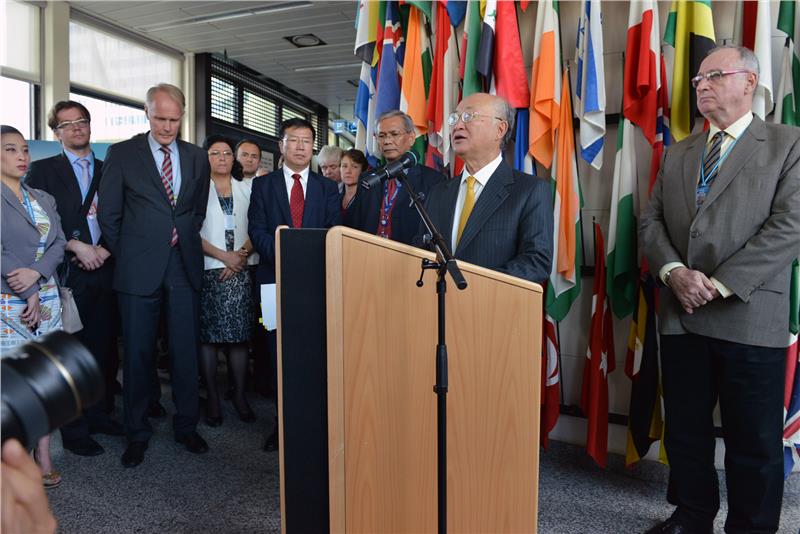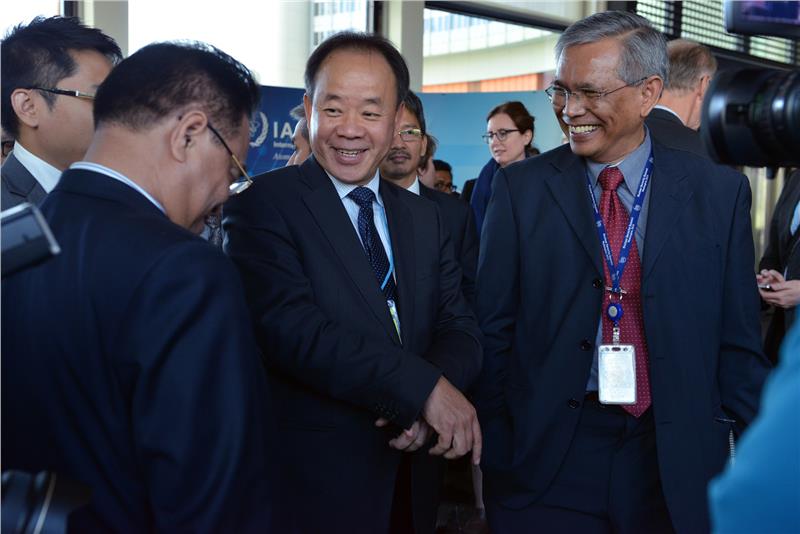In the framework of the 58th General Assembly Session of International Atomic Energy Agency (IAEA), on the 50th anniversary of the establishment of conjugated laboratory between the IAEA and Food & Agriculture Organization (FAO) on application of nuclear techniques in agriculture and food, the IAEA has awarded to individuals and organizations of country members. These countries had many achievements in the field of mutation breeding, and contributing effectively to ensure food security and sustainable development. The awards given this time had to pass a very tight review process with the specific quantitative criteria of the results achieved in the field of mutation breeding by radiation. Through the Vietnam Ministry of Science and Technology, the country had sent 3 registration dossiers to be awarded. And, all 3 dossiers were accepted by IAEA, including an outstanding achievement award.
Attendants of the rewarding ceremony of the IAEA are Yukiya Amano, IAEA General Director, IAEA officials, and representatives of countries attending the 58th General Assembly of the IAEA. Vietnam delegation attending the 58th General Assembly of the IAEA was led by Ambassador Nguyen Thiep. Speaking at the ceremony, General Director of IAEA appreciated the contribution of nuclear technology in ensuring the sustainable development goals of countries. Vietnam has been mentioned in his speech as a stark example of the nuclear application techniques for the sustainable agricultural development and food security. Ambassador Nguyen Thiep on behalf of Vietnam received the award of the IAEA.

Before that, the conjugated laboratory FAO - IAEA held a press conference on the achievements of the nuclear techniques application in mutation breeding. Ambassador Nguyen Thiep is the only representative of IAEA country member were invited to the conference and had a speech to reporters. The ambassador stressed the policy of Vietnam on promoting the application of science and technology for the social and economic development, including nuclear science and technology in the field of Vietnam agriculture and rural development to serve goal of ensuring food security and ensuring food safety. He thanked IAEA for cooperation to help Vietnam in recent years in promoting the nuclear techniques application to ensure safety, security and non-nuclear proliferation. The ambassador also said that the achievement of radioactive mutant is integral to the support and tremendous help of IAEA to Vietnam in recent years. The ambassador wished to continue receiving the support of IAEA, and reaffirmed Vietnam's commitment to comprehensive cooperation with the IAEA to develop atomic energy for peace and ensure safety, security and non-nuclear proliferation.
Vietnam is an agricultural country with over 70% of the population working in agricultural sector. So, food security is the top priority of Vietnam government. Along with the application of innovation policy, Vietnam government has advocated to promote the application of science and technology, including science and nuclear technology in the field of food and agriculture to ensure food security and make Vietnam become the second largest rice exporter in the world in the. Mutation breeding by radiation is a technique applied in Vietnam since the 1970s. With the help of the IAEA, since the 1980s, by technical cooperation projects, the agricultural research institutes of Vietnam (Agricultural Genetics Institute, Institute of Agricultural Sciences for Southern Vietnam, Cuu Long Delta Rice Research Institute, Vietnam Atomic Energy Institute, Dalat Nuclear Research Institute, and facilities of Science & Technology) have boosted to research the application. Many radioactive mutant strains were created with high yield, good quality and resistant to harsh environmental conditions such as salinity and pest resistance. One in five rice varieties for staple export of Vietnam are generated from radioactive mutants. Over 50% of land cultivated soybean varieties currently uses radioactive mutants.

Vietnam is assessed by IAEA as the 8th largest country in the world in the field of research on mutation breeding. Currently, Vietnam annual reaches the amount of 43 million tons of rice, exports 6 million tonnes with the revenue of US$ 3 billion. Rice production not only ensures food security in Vietnam, but also helps farmers increase their income and reduce poverty in recent years. The mutant rice varieties are currently cultivated on 3.5 million hectares, and increase income for farmers to hundreds of millions of dollars each year. VND- 95-20 mutant rice variety with high quality and mangrove resistant is key variety to exports, accounting for 30% of 1 million hectares of arable land in the Mekong Delta. VND-99-3 mutant rice variety with high quality is suitable for export growth duration of 100 days and can be planted 3 seasons in a year. The Outstanding Achievement Award in mutation breeding gave to Vietnam Agricultural Genetics Institute is fully deserved. In addition, Vietnam also received two awards for its achievements in the field of mutation breeding for Institute of Agricultural Sciences for Southern Vietnam and Vietnam Atomic Energy Institute, and for two individuals of Long An Department of Science and Technology, Ho Cong Cua and Tran Tan Phuong who has achieved accomplishments in the field of mutation breeding. The awards that Vietnam received are the recognition of contributions of IAEA to activities of Vietnam mutation breeding by radiation in recent years.
